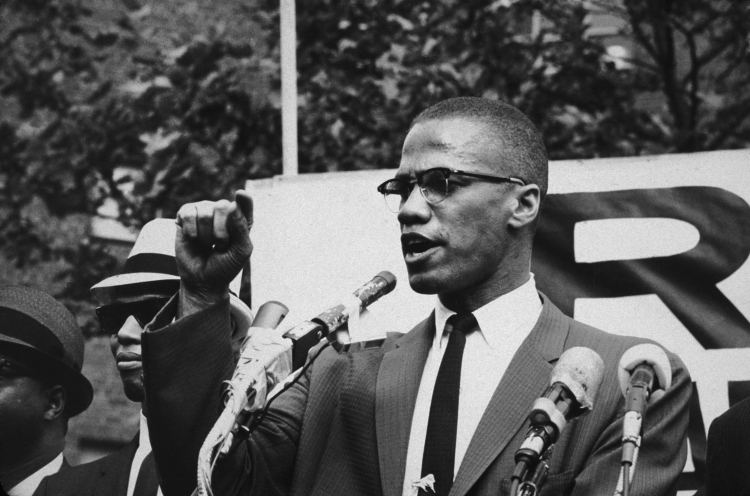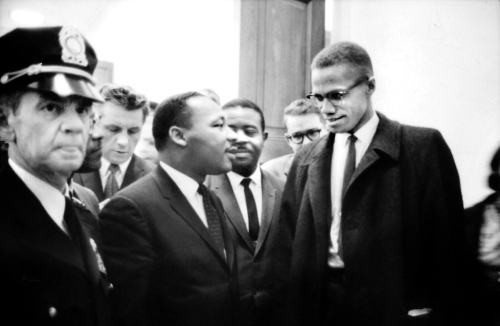The Library Recognizes Malcolm X's Centennial Birthday

May 19 is the 100th birthday of the controversial and magnetic Civil Rights leader Malcolm X.
The Autobiography of Malcolm X – written in collaboration with Alex Haley and published nine months after his assassination in 1965 – detailed his troubled childhood, conversion to the Black Muslim faith, activism, and pivot to more orthodox Islam.
Music journalist and cultural critic Touré described the book as one that “changed countless lives” and influenced generations “who admire his force, his courage, his brilliance, and his way of merging the protean trickster and the bold intellectual activist and the inspiring preacher.”
Throughout May, the Library celebrates Malcolm X with film screenings, book groups, reading lists, and other programming.
The Black Classics book group meets the fourth Saturday of each month at the Bluford Branch with a focus on works of fiction, poetry, drama, and nonfiction by Black authors. This month’s pick is The Autobiography of Malcolm X. Senior Library Assistant Bernard Norcott leads the book group and has worked at the Library for nearly 28 years.

Norcott notes that Malcolm X’s approach was more radical than that of other Black liberation leaders, such as Martin Luther King Jr., who advocated non-violence. Instead, Malcolm X argued that Black Americans should secure their rights “by any means necessary.”
“I've come to see Malcolm X more as a much more positive figure than I would have when I was younger,” says Norcott. “Partly, this is my growing up Catholic: His story is a story of redemption … And, you know, I'm sort of a sucker for redemption stories.”
Born Malcolm Little in Omaha, Nebraska, Malcolm X later changed his name to El-Hajj Malik El-Shabazz.
Malcolm X’s father died when he was six in a streetcar accident, and, in his early teens, his mother was committed to a state mental hospital after a nervous breakdown.
After bouncing between foster homes, he moved to Boston to live with an older sister and got involved in criminal activity; he was arrested at the age of 18 for breaking into a jewelry store.
During his time in prison, he learned about the Nation of Islam’s Black nationalist teachings. Later, he became the public face of the organization as a minister in the 1950s and ‘60s, speaking around the country and recruiting members.

“For someone whose initial upbringing was not particularly promising, he was extremely eloquent,” says Norcott. “He really is sort of a commanding figure, but he's also able to articulate stuff in a way that people can understand, which you know is no mean skill.”
Civic Engagement Specialist Sharon Sanders Brooks says many of Malcolm X’s messages, including working together for the common good and the importance of education, still resonate today. He engaged more in the Civil Rights movement later in life, advocating for other issues, such as voter registration.
“And his love for libraries,” she adds. “He said, ‘My alma mater was books, a good library … I could spend the rest of my life reading, just satisfying my curiosity.”
For Sanders Brooks, reading Malcolm X’s Autobiography had a profound impact and, she says, the book's cover with its red letters is “seared” in her memory.
"I see why so many people say the same thing, that after they read that autobiography, they remember it for the rest of their lives.”
Look for book displays inside Library branches, including the Central Library (May 18–31) and the Southeast Branch. And join the Library for the following public programs and activities:
- Film Screening: Malcolm X
Friday, May 16, 1 to 4 p.m. | Central Library, 3North Resource Center
Join us for a screening of the 1992 film Malcolm X. Directed and co-written by Spike Lee, Academy Award nominee Denzel Washington plays the title role. - 100 Years of Malcolm X: A Tribute to His Life and Legacy
Sunday, May 18, 2 to 5 p.m. | Lucile H. Bluford Branch
The event features an exhibition, music, poetry and a discussion of Malcolm X’s life and legacy. The program is co-sponsored by the National Black United Front-KC Chapter. Light refreshments will be provided. - Film Screening: Malcolm X
Monday, May 19, 1 to 4:30 p.m. | Southeast Branch
Directed by Spike Lee and featuring an Academy Award-nominated performance by Denzel Washington, Malcolm X is a riveting and humanizing biography of a man at the center of a storm of change. Light refreshments will be served. The program is co-sponsored by the National Black United Front-KC Chapter, Kansas City Defender and Community Movement Builders.
Additional Resources
Black Thought and Culture is a digital collection of approximately 100,000 pages of nonfiction writing by major American Black leaders –teachers, artists, politicians, religious leaders, athletes, veterans, entertainers, and other figures – covering 250 years of history.
A Library card is required to access from outside the Library. (Need one? Get a card here.)
The Kansas City Black History website features online biographies, essays, educational resources, and additional content that highlights the legacies and accomplishments of notable African Americans who blazed trails, broke barriers, and shaped our city’s history.